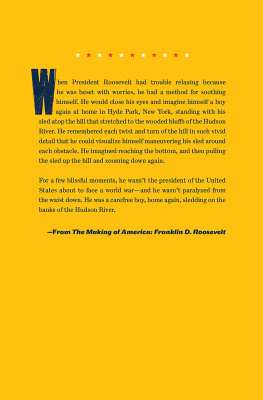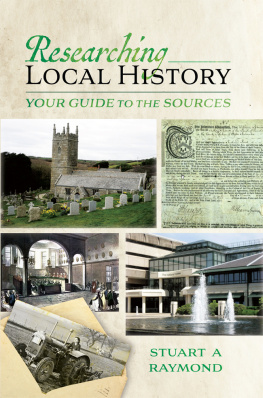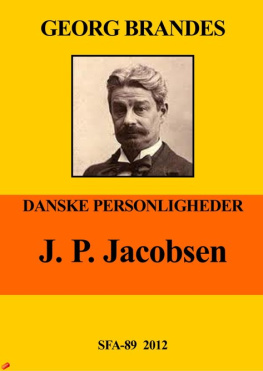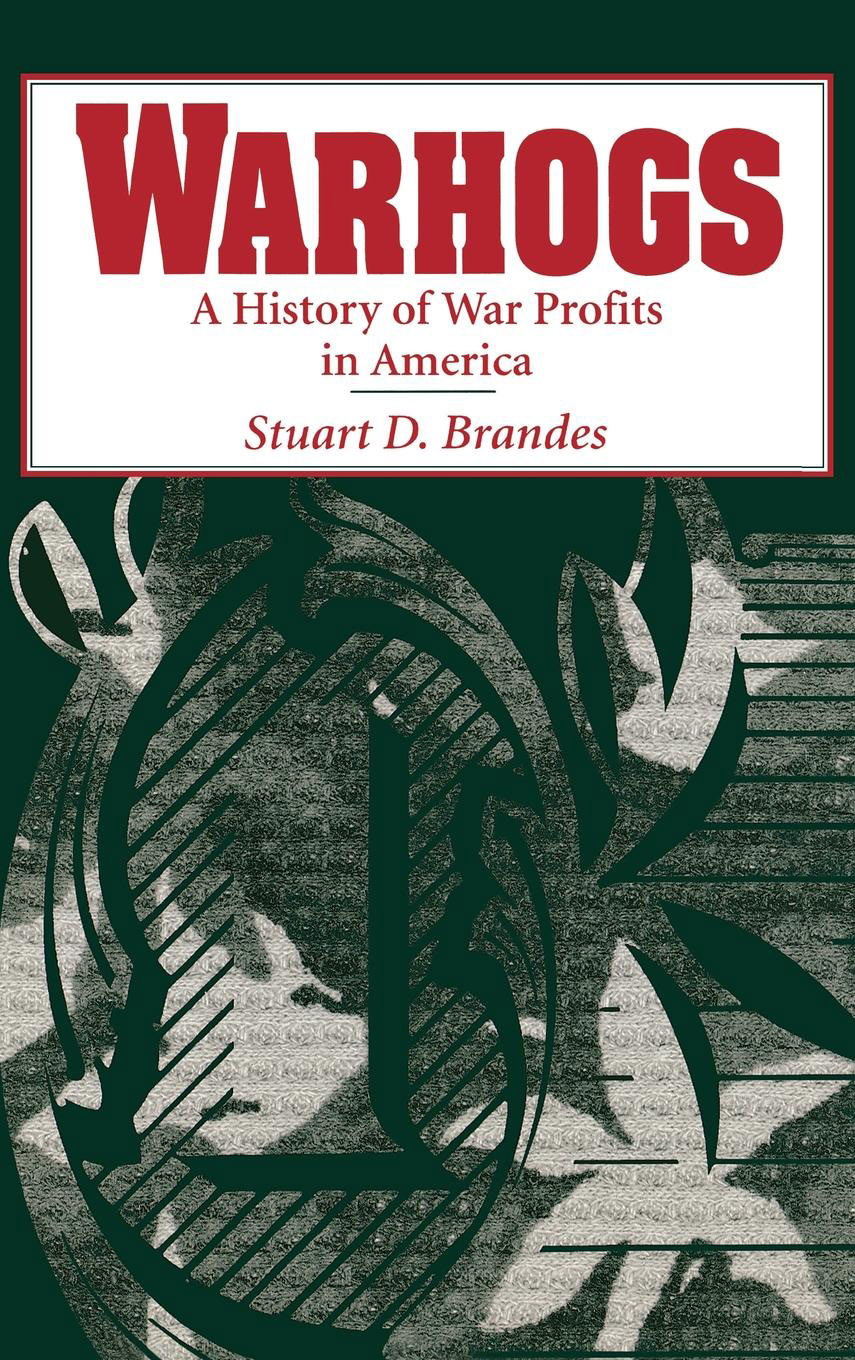WARHOGS
WARHOGS
A History of War Profits in America
Stuart D. Brandes

Publication of this volume was made possible in part by a
grant from the National Endowment for the Humanities.
Copyright 1997 by The University Press of Kentucky
Scholarly publisher for the Commonwealth,
serving Bellarmine College, Berea College, Centre
College of Kentucky, Eastern Kentucky University,
The Filson Club Historical Society, Georgetown College,
Kentucky Historical Society, Kentucky State University,
Morehead State University, Murray State University,
Northern Kentucky University, Transylvania University,
University of Kentucky, University of Louisville,
and Western Kentucky University.
All rights reserved.
Editorial and Sales Offices: The University Press of Kentucky
663 South Limestone Street, Lexington, Kentucky 40508-4008
01 00 99 98 97 5 4 3 2 1
Library of Congress Cataloging-in-Publication Data
Brandes, Stuart D. (Stuart Dean), 1940
Warhogs: a history of war profits in America / Stuart D. Brandes.
p. cm.
Includes bibliographical references and index.
ISBN 0-8131-2020-9 (cloth: alk. paper)
1. WarEconomic aspectsUnited StatesHistory.
2. ProfiteeringUnited StatesHistory. I. Title.
HC110.D4B716 1997
355.02dc21 96-53139
for Polly, Carolyn, and Marcia
When the Host goeth forth against thine Enemies,
then keep thee from every wicked thing.
Deuteronomy 23:9
Contents
Acknowledgments
During the preparation of this manuscript, I have benefited from the assistance, advice, and encouragement of many friends and colleagues. It is impossible to recognize all of them, but several deserve special mention. Scholars who generously agreed to read and correct errors in various parts of the manuscript include Fred Anderson, E. Wayne Carp, Edward M. Coffman, Robert Cuff, John E. Ferling, J. Matthew Gallman, Laurence Gelfand, Don Higginbotham, James A. Huston, Ludwell Johnson, Mark Leff, and Harold Selesky. Colleagues who offered helpful suggestions include David Huehner, James Lorence, Robert Storch, and Kerry Trask.
The manuscript could not have been completed without the generous financial support of several institutions. The Institute for Research in the Humanities, University of Wisconsin/Madison, directed by Robert Kingdon, invited me to spend a stimulating and rewarding year as a visiting fellow. The University of Wisconsin Centers permitted me to take leave and provided a sabbatical grant at a crucial stage of the project. At other stages I received helpful support from the Eleanor Roosevelt Institute and from the University of Wisconsin Graduate School.
Librarians are the unsung heroes of the scholarly world, and many have assisted me. Special recognition is due, however, to the late Gary J. Lenox, a great bibliophile, a warm friend, and the very resourceful director of the library at the University of Wisconsin Center-Rock County. At the State Historical Society of Wisconsin in Madison I received indispensable aid from Loraine Adkins, Michael Edmonds, and John Peters. Carolyn Brandes Crawford, then an undergraduate student, served efficiently as my research assistant. My wife, Polly Powrie Brandes, endured absence, tardiness, and weariness with her customary equanimity. She also read the entire manuscript, and her keen eye corrected countless errors in grammar and usage. She deserves special appreciation.
Introduction
It must give great Concern to any considerate Mind that when this whole Continent at a vast expence of Blood & Treasure is endeavoring to establish its Liberties,... there are Men among us so basely sordid as to Counteract all our Exertions for the Sake of a little Gain.
GEORGE WASHINGTON, APPEAL TO NEW YORK (1775)
Jail? You want me to go to jail?... Who worked for nothin in that war?... When they work for nothin, Ill work for nothin. Did they ship a gun or a truck outa Detroit before they got their price?... Half the Goddam country is gotta go if I go!
JOE KELLER, IN ARTHUR MILLERS ALL MY SONS (1947)
In the evening of what otherwise had been a bright and promising April day in 1607, a band of native warriors concealed themselves upon a spit of land known to others as Virginia. After secretly observing the strangers who had rowed ashore that morning, they decided, correctly as it turned out, that the uninvited callers were not simply casual visitors but were instead the dangerous vanguard of an occupying force. The bowmen crept within close range of the trespassers, loosed their arrows, and stained the sand with English blood. The English detachment answered with a fusillade of musketry and then prudently withdrew to the safety of their squadron. American history, defined as commencing with the arrival of the first permanent English settlers in North America, was only a few hours old, but it had already experienced its first military engagement. Two Englishmen had been wounded.
Over the next four centuries, countless skirmishes, raids, invasions, and similar acts of war would follow. Millions of contestants would be engaged, and costs and casualties would rise geometrically. War in its many formsaggressive or defensive, Revolutionary or Civil, colonial or general, declared or undeclared, low-intensity or limited, hot or coldwas fought, threatened, or, at the very least, prepared for almost continuously as the American story unfolded. Mars called on the North American community regularly, and each time he exacted a terrible toll in blood and treasure.
When English settlers first fought Indian warriors along the Atlantic coastline, both sides maintained firmly established military customs, derived from centuries of experience, about why and how to engage in warfare. Although both had goals that were broadly economic, Europeans had long fought for purposes that were, in varying degree, more explicitly monetary. Romans were skilled in the art of plunder, and looting and booty remained common features of the Middle Ages. The capturing of prisoners for ransom was a well developed industry in Europe.
Both sides soon realized that a very different enemy who fought in different ways required a modification of strategy and tactics. An American way of warfare must necessarily develop. But although it was soon apparent that New World conditions would dictate a new way of fighting, it was less obvious (but equally inevitable) that these new circumstances would change the way that soldiers would be supplied with the sinews of war. The military customs of feudal Europe must gradually give way to more American and ultimately more democratic means of waging warfare.
While much has been written about the evolution of American military strategy and tactics, economic mobilization in support of the troops has received comparatively little attention. This book addresses three aspects of this topic: the form and appearance of American traditions of mobilization, the ethical problems associated with mobilization, and the growth and success of administrative procedures intended to ensure that mobilization is carried out with efficiency and equity.
The first issue considered is how Americans have striven to distribute the burden of mobilizing economic resources for military purposes differently from their European ancestors. Since the first colonial settlements, Americans have never fully agreed on how, if at all, vital military supplies could be procured fairly and practically under American conditions. Nevertheless, they very early acknowledged that the ways of Europe by which feudal lords richly benefited from war while the lower and middle classes sacrificed must cease. The old military system must certainly be transformed, which they agreed would be a welcome step, but a question lingered: Could the New World find a way to share wars economic burden more equitably? Could the economic cost of war be distributed among the population so that no one paid unjustly and no one acquired undue gains? In short, could war be financed in an










